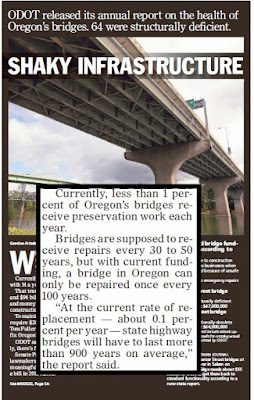The transit package aims to raise $5 million per year, and the Third Bridge package aims to raise more than $45 million per year.*
 |
| Maybe you're a design wiz and can come up with a better infographic? |
From here, of course, this needs little analysis. The dead-weight of a giant new bridge and highway and its ongoing maintenance liability swamps any downside to better transit. (And really, what downside to better transit is there?)
We can't afford to maintain our current bridges to "normal" maintenance standards, and on top of that we can't afford to reinforce our current bridges to "megaquake" standards.
There is no way it makes sense to add to our deferred maintenance and seismic liabilities by building a shiny new bridge we are nearly certain will not make it out of a big seismic event.
 |
| The Salem Alternative is still in a liquefaction zone (via N3B, adapted from chapt 3.18 of the DEIS) |
One problem for the comparison with Cherriots might be one of casual magnitudes.
The Cherriots tax can be expressed as $2.10/$1,000 of payroll. The proposed bridge property tax component is $0.37/$1,000 of property (plus the other stuff).
That's a difference in rate of an order of magnitude - but of course they are taxing very different things, payroll vs. total property value.
I don't know how to make a better comparison there. Comparing the two tax packages is complicated, and doesn't seem to resolve to a witty soundbite. (Maybe you can think of one?)
But the fact is, proponents of the Third Bridge want to suck out of the community a whole lot more in taxes than do proponents of good transit.
And whether that is a good investment deserves more scrutiny by those who are inclined to oppose new taxes.
* The December 2014 Funding Booklet assumes that to service a debt of $430 million, $46.4 million is required annually. The toll, tax, and fee breakdown comes from the March 4, 2015 Funding Strategy Memo.




3 comments:
It doesn't compress into a witty soundbite. Property tax compression further complicates the issue (which I can't even explain). But from what I do understand, only a small number of properties not in compression would pay a property tax levy for transit (making it truly unfair).
Taxpayers have been paying a transit tax for decades. It is built into our taxes and this tax would not impact that situation. Makes even more sense to impose a payroll tax...especially since it captures a segment of the community that is currently not paying anything. Salem Hospital doesn't even pay a property tax at all, so they get free fire and police protection as well as transit.
In my mind when I see the 'Unfair' statement in the vote no posters, I just mentally block out the 'un' and think of it as a 'fair' tax.
I'm not literate enough on the mechanics of property tax compression to debate Susann. Jerry Thompson of the SK Transit Board has said that this is the reason that they chose not to pursue a property tax levy. He is a very smart person that has studied these issues in depth so I am inclined to trust him.
I will be voting for the measure but to convince undecided voters, supporters need to form a coherent argument on why the payroll tax is fairer than a property tax. "Mentally blocking 'un'" does not sound like a very strong argument to me.
Post a Comment